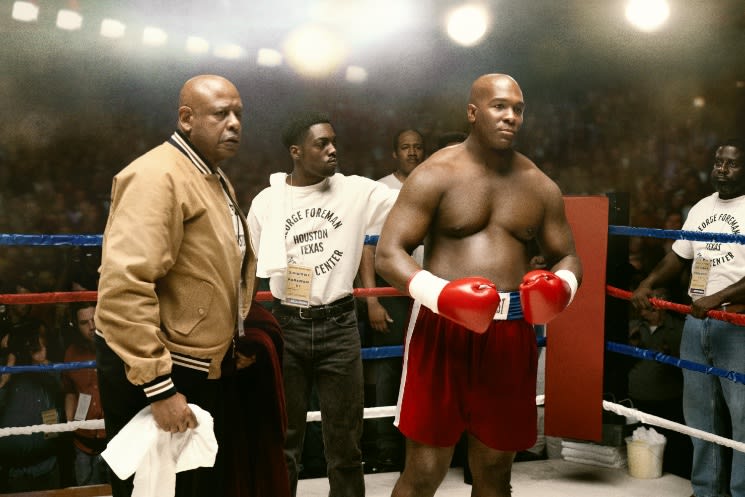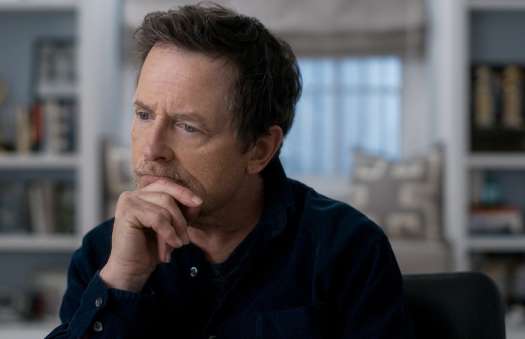Amusingly, George Foreman's cultural legacy has less to do with his achievements as the two-time heavyweight champion of the world and more to do with his iconic grill. It's not because he wasn't a great boxer — one doesn't become a champion through dumb luck — but because he didn't possess the vibrant personality of a ferociously counter-cultural Muhammad Ali or the brash combustibility of a Mike Tyson. Foreman's humble, faith-driven story is well in the shadows of those two boxers, and the aggressively mediocre cinematic retelling of it further dives into those recesses in Big George Foreman: The Miraculous Story of the Once and Future Heavyweight Champion of the World.
Big George Foreman is as conventional as a biopic can get, barely scratching at the surface of an uplifting, heavyweight story with extremely lacklustre, lightweight blows. Instead of tapping into the complexities and various doubts at the heart of Foreman's journey, director and co-writer George Tillman Jr. deems it fit to create a film that serves more as faith-based propaganda than a boxing biopic. Even when it does finally get to the fights, they somehow disappoint even more than the stilted storytelling.
Opening with the line, "I was 28 years old when I died," Big George Foreman snaps back into time to detail its protagonist's impoverished upbringing, replete with bullying and the love of a devout mother (Sonja Sohn). When we return to an adult Foreman (Khris Davis), we find him at his rock bottom. After an attempt at jumping a drunkard goes wrong, Foreman covers himself in excrement to escape the snuffle of a police canine.
Determined to put his life on the right track, he joins the Job Corps, where his big build and hot temper catches the attention of Doc Broadus (Forest Whitaker), a former professional boxer who teaches Foreman how to put those fists to sporting use. With the help of Broadus, Foreman begins a legendary career full of crushing defeats and triumphs that comes to an abrupt end following a near-death experience that Foreman credits as an encounter with Jesus.
A new era of Foreman is ushered in when he decides to become a Baptist preacher. However, when the threat of bankruptcy looms due to misplaced trust in the wrong people and his community youth centre is at risk of repossession, he dons the gloves once again. This second act of Foreman's boxing career is driven not only by a need to reclaim his lost fortune, but a calling from Christ himself to reclaim the heavyweight championship.
Foreman's life is fascinating, yet it's so prosaically told. Big George Foreman renders its story about faith and perseverance unfathomably unholy, not only punching down at the audience with its dull, formulaic flourishes, but God as well in the process. The movie cheapens and dilutes man's relationship with the divine into one that is transactional rather than unconditional with each feigned tug at the heartstrings.
Big George Foreman is the epitome of cliché. It's abound with jarring time jumps (signalled with the ugliest title cards in recent memory), a soundtrack full of generic oldies and dull, overcompensating narration that is only surpassed by the terrible dialogue — featuring stunners like: "Rope-a-dope, and I was the dope."
Tillman Jr.'s screenplay, co-written with Frank Baldwin, fails to substantially and patiently build towards Foreman's faithful revelation. Opting instead for a sudden acceptance, harshly cutting to black and forcing audiences to accept his conversion to Christ. The film also doesn't explore why he specifically chose Christ and what specific role he plays in the process, outright rejecting the existence of other creeds.
This ignorance is readily apparent in the movie's cartoonish, antagonistic depiction of Muhammad Ali (Sullivan Jones). Ali's belief in Islam, in direct contrast to Foreman's sudden acceptance of Christianity, is the perfect platform with which to interrogate and explore the nature of faith and ideology. But Tillman Jr. and company conveniently ignore it — steadfast in their pursuit of Christian supremacy.
Another squandered moment is the 1968 Olympics. Foreman's gold medal win came at a time of great racial strife in America — many will recall John Carlos and Tommie Smith's defiant Black Power salute at the podium sending a poignant message around the world. In contrast, Foreman's patriotic flag waving following his victory rubbed many African-Americans the wrong way. These social politics, while ripe with commentary, is represented as a trifle, something that damages his pride and ego, rather than something consequential to the Black community at large. Missed opportunities like these are telling of a film content with emphasizing the bones of a story rather than the meat.
The over-polished cinematography only serves to further the bland experience with its late '60s/early '70s setting never feeling lived in, merely existing as set dressing. When the story shifts to the late '80s and early '90s, the America it depicts is virtually indistinguishable from what came before, taking us through the life and times of a legendary athlete in the shoddiest way possible.
This derivative filmmaking extends to the boxing itself, with historic bouts significantly lacking impact and often feeling rushed as if this boxing movie hates boxing. Even the fabled match between Foreman and Ali is fumbled. Typically archived through the eyes of Ali, Big George Foreman could have taken us through the tragic missteps of Foreman from his unique perspective. Instead, The Rumble in the Jungle is depicted as anything but, with a mawkish score and over-reliance on slow motion snuffing out the moment's thrills and significance.
The performances across the board are serviceable, with The Wire alumni, Sohn and Lawrence Gilliard Jr. as Foreman's pro trainer, Archie Moore, serving as minor highlights. Davis nails Foreman's demeanour as a gentle giant, but lacks the emotive force required for the film's more tragic sequences. And then there's Forest Whitaker, who turns in his most forgettable performance, transforming Doc Broadus into one of the more generic coaches committed to celluloid.
Big George Foreman mercifully breezes through its final act, aptly ending on an anti-climatic note that unsurprisingly presents Foreman's iconic comeback through a trivial, voiceover-heavy sequence.
It's tough to imagine that God would even want to be associated with this movie, as its banal, hackneyed look at the nature of faith is far more wretched than sublime. Big George Foreman is not only a bad faith-based film, but it doubles as a terrible boxing movie that does a grave disservice to divinity, the sport and audiences who are duped into seeing it.
(Sony)Big George Foreman is as conventional as a biopic can get, barely scratching at the surface of an uplifting, heavyweight story with extremely lacklustre, lightweight blows. Instead of tapping into the complexities and various doubts at the heart of Foreman's journey, director and co-writer George Tillman Jr. deems it fit to create a film that serves more as faith-based propaganda than a boxing biopic. Even when it does finally get to the fights, they somehow disappoint even more than the stilted storytelling.
Opening with the line, "I was 28 years old when I died," Big George Foreman snaps back into time to detail its protagonist's impoverished upbringing, replete with bullying and the love of a devout mother (Sonja Sohn). When we return to an adult Foreman (Khris Davis), we find him at his rock bottom. After an attempt at jumping a drunkard goes wrong, Foreman covers himself in excrement to escape the snuffle of a police canine.
Determined to put his life on the right track, he joins the Job Corps, where his big build and hot temper catches the attention of Doc Broadus (Forest Whitaker), a former professional boxer who teaches Foreman how to put those fists to sporting use. With the help of Broadus, Foreman begins a legendary career full of crushing defeats and triumphs that comes to an abrupt end following a near-death experience that Foreman credits as an encounter with Jesus.
A new era of Foreman is ushered in when he decides to become a Baptist preacher. However, when the threat of bankruptcy looms due to misplaced trust in the wrong people and his community youth centre is at risk of repossession, he dons the gloves once again. This second act of Foreman's boxing career is driven not only by a need to reclaim his lost fortune, but a calling from Christ himself to reclaim the heavyweight championship.
Foreman's life is fascinating, yet it's so prosaically told. Big George Foreman renders its story about faith and perseverance unfathomably unholy, not only punching down at the audience with its dull, formulaic flourishes, but God as well in the process. The movie cheapens and dilutes man's relationship with the divine into one that is transactional rather than unconditional with each feigned tug at the heartstrings.
Big George Foreman is the epitome of cliché. It's abound with jarring time jumps (signalled with the ugliest title cards in recent memory), a soundtrack full of generic oldies and dull, overcompensating narration that is only surpassed by the terrible dialogue — featuring stunners like: "Rope-a-dope, and I was the dope."
Tillman Jr.'s screenplay, co-written with Frank Baldwin, fails to substantially and patiently build towards Foreman's faithful revelation. Opting instead for a sudden acceptance, harshly cutting to black and forcing audiences to accept his conversion to Christ. The film also doesn't explore why he specifically chose Christ and what specific role he plays in the process, outright rejecting the existence of other creeds.
This ignorance is readily apparent in the movie's cartoonish, antagonistic depiction of Muhammad Ali (Sullivan Jones). Ali's belief in Islam, in direct contrast to Foreman's sudden acceptance of Christianity, is the perfect platform with which to interrogate and explore the nature of faith and ideology. But Tillman Jr. and company conveniently ignore it — steadfast in their pursuit of Christian supremacy.
Another squandered moment is the 1968 Olympics. Foreman's gold medal win came at a time of great racial strife in America — many will recall John Carlos and Tommie Smith's defiant Black Power salute at the podium sending a poignant message around the world. In contrast, Foreman's patriotic flag waving following his victory rubbed many African-Americans the wrong way. These social politics, while ripe with commentary, is represented as a trifle, something that damages his pride and ego, rather than something consequential to the Black community at large. Missed opportunities like these are telling of a film content with emphasizing the bones of a story rather than the meat.
The over-polished cinematography only serves to further the bland experience with its late '60s/early '70s setting never feeling lived in, merely existing as set dressing. When the story shifts to the late '80s and early '90s, the America it depicts is virtually indistinguishable from what came before, taking us through the life and times of a legendary athlete in the shoddiest way possible.
This derivative filmmaking extends to the boxing itself, with historic bouts significantly lacking impact and often feeling rushed as if this boxing movie hates boxing. Even the fabled match between Foreman and Ali is fumbled. Typically archived through the eyes of Ali, Big George Foreman could have taken us through the tragic missteps of Foreman from his unique perspective. Instead, The Rumble in the Jungle is depicted as anything but, with a mawkish score and over-reliance on slow motion snuffing out the moment's thrills and significance.
The performances across the board are serviceable, with The Wire alumni, Sohn and Lawrence Gilliard Jr. as Foreman's pro trainer, Archie Moore, serving as minor highlights. Davis nails Foreman's demeanour as a gentle giant, but lacks the emotive force required for the film's more tragic sequences. And then there's Forest Whitaker, who turns in his most forgettable performance, transforming Doc Broadus into one of the more generic coaches committed to celluloid.
Big George Foreman mercifully breezes through its final act, aptly ending on an anti-climatic note that unsurprisingly presents Foreman's iconic comeback through a trivial, voiceover-heavy sequence.
It's tough to imagine that God would even want to be associated with this movie, as its banal, hackneyed look at the nature of faith is far more wretched than sublime. Big George Foreman is not only a bad faith-based film, but it doubles as a terrible boxing movie that does a grave disservice to divinity, the sport and audiences who are duped into seeing it.




